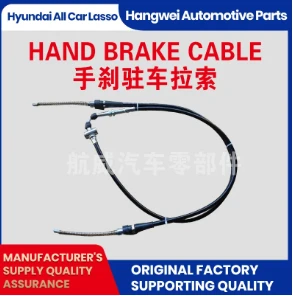clutch master cylinder hydraulic line
Understanding the Clutch Master Cylinder and Hydraulic Line Essential Components of Your Vehicle’s Clutch System
The clutch master cylinder and hydraulic line play pivotal roles in the functionality of a vehicle's clutch system. While many drivers may take these components for granted, understanding their significance can save you from costly repairs and improve your vehicle's performance. In this article, we will delve into the workings of the clutch master cylinder and hydraulic line, exploring their functions, common issues, and maintenance tips.
What is a Clutch Master Cylinder?
The clutch master cylinder is a critical component in a hydraulic clutch system. It is responsible for converting the mechanical force from the clutch pedal into hydraulic pressure. When a driver presses the clutch pedal, the master cylinder uses this force to push a piston inside its housing, which then creates pressure in the hydraulic line. This pressure is transmitted to the slave cylinder, typically located near the transmission. The slave cylinder then disengages the clutch, allowing the driver to change gears smoothly.
The Role of the Hydraulic Line
The hydraulic line, which connects the clutch master cylinder to the slave cylinder, serves as a conduit for the hydraulic fluid. This fluid is usually brake fluid, a critical element that enables the transfer of pressure from the master cylinder to the slave cylinder. The integrity of this line is crucial; any leaks or blockages can lead to a malfunctioning clutch system.
Common Issues with Clutch Master Cylinders and Hydraulic Lines
Several common problems can affect the clutch master cylinder and hydraulic line, leading to clutch issues that can impact vehicle performance
1. Fluid Leaks One of the most frequent problems with hydraulic clutch systems is leaking fluid. Leaks can occur at the master cylinder seals, the hydraulic line, or the slave cylinder. A drop in hydraulic fluid levels can lead to a soft or unresponsive clutch pedal, making it difficult to engage or disengage the clutch.
2. Air in the System If air gets into the hydraulic line, it can compress with pedal pressure, leading to a spongy or ineffective clutch pedal. Bleeding the system is necessary to remove trapped air and restore proper function.
clutch master cylinder hydraulic line

3. Worn Components Over time, seals and hoses can wear out or deteriorate. A worn master cylinder may not generate enough pressure, while a cracked hydraulic line can lead to fluid loss. Regular inspections can help identify and mitigate these risks before they lead to significant issues.
4. Clutch Pedal Issues If the clutch pedal feels unusually stiff or goes to the floor with little resistance, it could indicate a failure in the clutch master cylinder or a problem with the hydraulic line.
Maintenance Tips
To ensure the longevity and optimal performance of your clutch system, consider the following maintenance tips
- Regular Fluid Checks Periodically check your hydraulic fluid levels. Low fluid levels can indicate leaks that need addressing.
- Inspect for Leaks Look for signs of fluid leakage around the master cylinder and along the hydraulic line. Detecting and repairing leaks early can prevent more extensive damage.
- Schedule Professional Inspections Regular inspections by a qualified mechanic can help identify issues early on. Mechanics can check for wear in the master cylinder and the hydraulic line, ensuring everything functions smoothly.
- Proper Clutch Use Avoid resting your foot on the clutch pedal while driving, as this can lead to unnecessary wear on the system.
Conclusion
The clutch master cylinder and hydraulic line are essential components of your vehicle’s clutch system, playing a crucial role in smooth gear shifts and overall driving performance. Understanding how these components work can empower you as a driver, enabling you to spot potential issues before they escalate. By regularly inspecting your clutch system and addressing any problems promptly, you can enhance the longevity and reliability of your vehicle, ensuring a safer and more enjoyable driving experience. Remember, a well-maintained clutch system not only improves your vehicle's function but also contributes to your overall driving safety.
-
The Right Handbrake Cable for Your VehicleNewsApr.09,2025
-
The Right Clutch Lines for Smooth PerformanceNewsApr.09,2025
-
How to Choose the Right Cables at the Best PriceNewsApr.09,2025
-
How to Choose and Maintain Gear Cables for Smooth ShiftingNewsApr.09,2025
-
Choosing the Right Throttle Cables for Smooth and Reliable PerformanceNewsApr.09,2025
-
Choosing the Right Control Cables for Your VehicleNewsApr.09,2025
